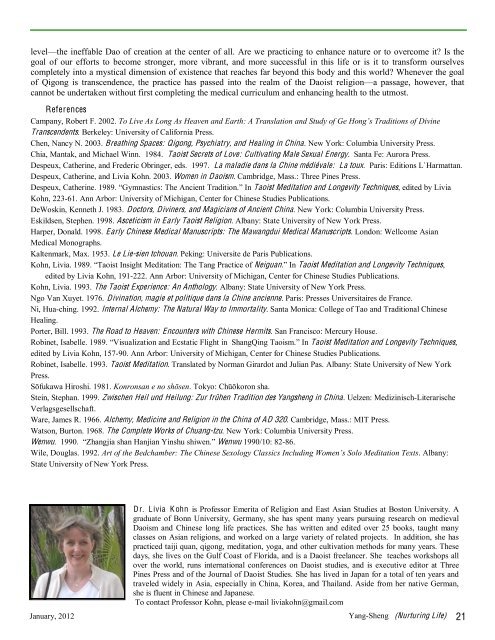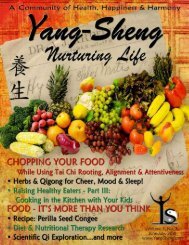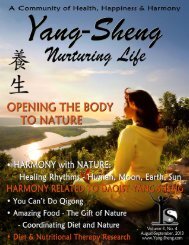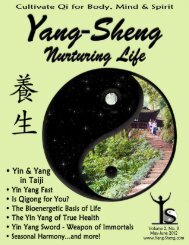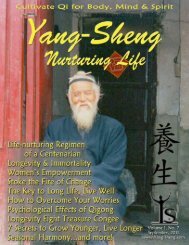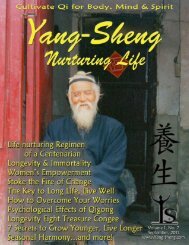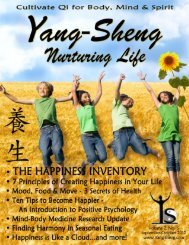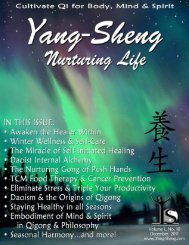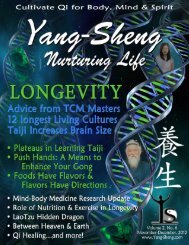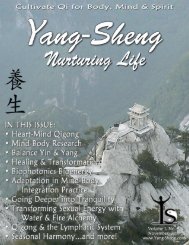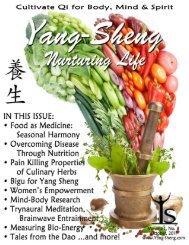Download PDF - Yang-Sheng
Download PDF - Yang-Sheng
Download PDF - Yang-Sheng
Create successful ePaper yourself
Turn your PDF publications into a flip-book with our unique Google optimized e-Paper software.
level—the ineffable Dao of creation at the center of all. Are we practicing to enhance nature or to overcome it? Is the<br />
goal of our efforts to become stronger, more vibrant, and more successful in this life or is it to transform ourselves<br />
completely into a mystical dimension of existence that reaches far beyond this body and this world? Whenever the goal<br />
of Qigong is transcendence, the practice has passed into the realm of the Daoist religion—a passage, however, that<br />
cannot be undertaken without first completing the medical curriculum and enhancing health to the utmost.<br />
References<br />
Campany, Robert F. 2002. To Live As Long As Heaven and Earth: A Translation and Study of Ge Hong’s Traditions of Divine<br />
Transcendents. Berkeley: University of California Press.<br />
Chen, Nancy N. 2003. Breathing Spaces: Qigong, Psychiatry, and Healing in China. New York: Columbia University Press.<br />
Chia, Mantak, and Michael Winn. 1984. Taoist Secrets of Love: Cultivating Male Sexual Energy. Santa Fe: Aurora Press.<br />
Despeux, Catherine, and Frederic Obringer, eds. 1997. La maladie dans la Chine médiévale: La toux. Paris: Editions L`Harmattan.<br />
Despeux, Catherine, and Livia Kohn. 2003. Women in Daoism. Cambridge, Mass.: Three Pines Press.<br />
Despeux, Catherine. 1989. “Gymnastics: The Ancient Tradition.” In Taoist Meditation and Longevity Techniques, edited by Livia<br />
Kohn, 223-61. Ann Arbor: University of Michigan, Center for Chinese Studies Publications.<br />
DeWoskin, Kenneth J. 1983. Doctors, Diviners, and Magicians of Ancient China. New York: Columbia University Press.<br />
Eskildsen, Stephen. 1998. Asceticism in Early Taoist Religion. Albany: State University of New York Press.<br />
Harper, Donald. 1998. Early Chinese Medical Manuscripts: The Mawangdui Medical Manuscripts. London: Wellcome Asian<br />
Medical Monographs.<br />
Kaltenmark, Max. 1953. Le Lie-sien tchouan. Peking: Universite de Paris Publications.<br />
Kohn, Livia. 1989. “Taoist Insight Meditation: The Tang Practice of Neiguan.” In Taoist Meditation and Longevity Techniques,<br />
edited by Livia Kohn, 191-222. Ann Arbor: University of Michigan, Center for Chinese Studies Publications.<br />
Kohn, Livia. 1993. The Taoist Experience: An Anthology. Albany: State University of New York Press.<br />
Ngo Van Xuyet. 1976. Divination, magie et politique dans la Chine ancienne. Paris: Presses Universitaires de France.<br />
Ni, Hua-ching. 1992. Internal Alchemy: The Natural Way to Immortality. Santa Monica: College of Tao and Traditional Chinese<br />
Healing.<br />
Porter, Bill. 1993. The Road to Heaven: Encounters with Chinese Hermits. San Francisco: Mercury House.<br />
Robinet, Isabelle. 1989. “Visualization and Ecstatic Flight in ShangQing Taoism.” In Taoist Meditation and Longevity Techniques,<br />
edited by Livia Kohn, 157-90. Ann Arbor: University of Michigan, Center for Chinese Studies Publications.<br />
Robinet, Isabelle. 1993. Taoist Meditation. Translated by Norman Girardot and Julian Pas. Albany: State University of New York<br />
Press.<br />
Sōfukawa Hiroshi. 1981. Konronsan e no shōsen. Tokyo: Chūōkoron sha.<br />
Stein, Stephan. 1999. Zwischen Heil und Heilung: Zur frühen Tradition des <strong>Yang</strong>sheng in China. Uelzen: Medizinisch-Literarische<br />
Verlagsgesellschaft.<br />
Ware, James R. 1966. Alchemy, Medicine and Religion in the China of AD 320. Cambridge, Mass.: MIT Press.<br />
Watson, Burton. 1968. The Complete Works of Chuang-tzu. New York: Columbia University Press.<br />
Wenwu. 1990. “Zhangjia shan Hanjian Yinshu shiwen.” Wenwu 1990/10: 82-86.<br />
Wile, Douglas. 1992. Art of the Bedchamber: The Chinese Sexology Classics Including Women’s Solo Meditation Texts. Albany:<br />
State University of New York Press.<br />
Dr. Livia K ohn is Professor Emerita of Religion and East Asian Studies at Boston University. A<br />
graduate of Bonn University, Germany, she has spent many years pursuing research on medieval<br />
Daoism and Chinese long life practices. She has written and edited over 25 books, taught many<br />
classes on Asian religions, and worked on a large variety of related projects. In addition, she has<br />
practiced taiji quan, qigong, meditation, yoga, and other cultivation methods for many years. These<br />
days, she lives on the Gulf Coast of Florida, and is a Daoist freelancer. She teaches workshops all<br />
over the world, runs international conferences on Daoist studies, and is executive editor at Three<br />
Pines Press and of the Journal of Daoist Studies. She has lived in Japan for a total of ten years and<br />
traveled widely in Asia, especially in China, Korea, and Thailand. Aside from her native German,<br />
she is fluent in Chinese and Japanese.<br />
To contact Professor Kohn, please e-mail liviakohn@gmail.com<br />
January, 2012 <strong>Yang</strong>-<strong>Sheng</strong> (Nurturing Life) 21


